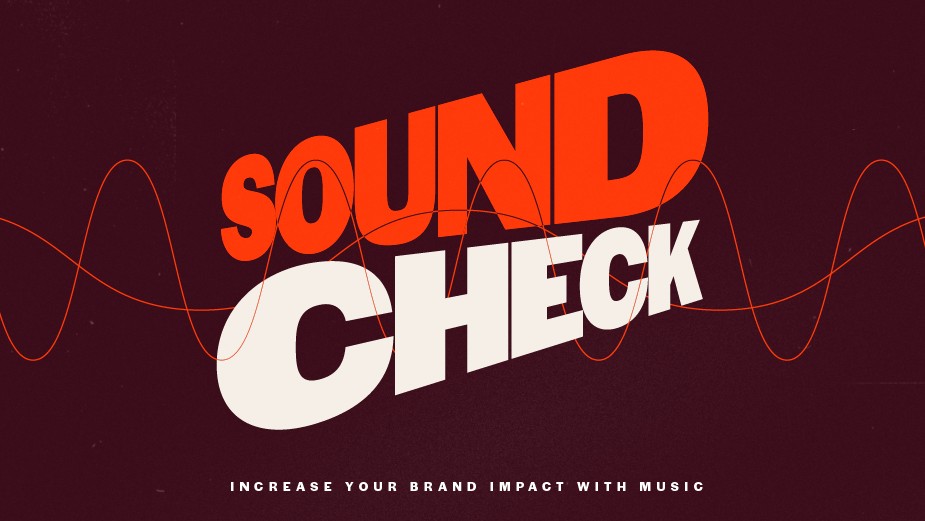
Give Your Brand a Sonic Health Check with this AI-Powered Tool

It’s hard to be objective about music and sound. Everyone’s got their own taste and opinions about what sounds good, which is a chronic annoyance for audio experts working in advertising – who actually know what works and what doesn’t work for a brand’s audio strategy.
In that context MassiveMusic has launched SoundCheck, a research tool designed to audit and enhance brands’ use of music and sound. Built on the company’s AI-powered MusicIQ methodology, it quantifies music’s impact on brand performance by evaluating distinctiveness, audience alignment, engagement and quality.
LBB’s Alex Reeves caught up with Roscoe Williamson, global creative strategy and innovation director, and Aifric Lennon, director, research strategy at MassiveMusic, to find out how it works.
LBB> For decades, experts have been trying to prove the value of sound and music to advertising. What has been the hardest impact to prove before now?
Roscoe> The hardest part of trying to prove the impact of music in advertising has been the lack of ability to isolate it as a factor. When you think about all the other competing commutation elements that go with a campaign, proving the impact of the music alone has been a real challenge.
LBB> How does SoundCheck deliver that?
Roscoe> SoundCheck solves this by isolating the impact of music both on a campaign level but also on a brand and category level. Through our MusicIQ methodology, we have isolated and validated the key metrics that influence a brand’s music performance and found tangible links between these factors and brand outcomes. For example, in a recent MusicIQ report we published on the sportswear industry, we found that brands with higher MusicIQs were 50% more likely to be the preferred brand in their category, even after correcting for market share. SoundCheck allows us to benchmark performance against industry standards, and even compare different music choices in controlled settings. By combining behavioural insights and AI-driven analysis, it shows how music influences engagement, recall and brand preference.
LBB> What was the major technological breakthrough that made SoundCheck possible?
Aifric> As part of the Songtradr group, we are lucky enough to have our own proprietary AI-tagging tool which can scan and tag any piece of music on over 400 unique variables, including brand personality, mood, emotion, genre, audience demographics and instrumentation. Through combining this proprietary technology with advanced statistical modelling, we have been able to develop our MusicIQ methodology, which allows us to assess a brand’s music performance at scale relative to their category. This has definitely been a breakthrough when it came to developing the backbone of SoundCheck!
LBB> What metrics does MusicIQ use to assess sound and music's performance? What are the outputs for brands?
Aifric> We scan a brand’s use of music across media channels including TV, Radio, TikTok, Instagram and YouTube, and calculate quantitative factors like musical consistency, distinctiveness, engagement, brand match and audience match via our comprehensive AI tagging system. We also make a qualitative analysis of the brand’s use of sonic branding tactics and broader music strategy. The key output for brands is a MusicIQ score benchmarked against their competitors, key insights on the strengths and weaknesses of the brand’s current approach to sound and music, and importantly, recommendations on how to improve.
LBB> Have you been able to plug in historic music choices and get some data on why they were strategically right for the brand?
Aifric> Yes, we have. This is a key part of the SoundCheck process – we look back at the brand’s historic use of music via MusicIQ, but we also run stakeholder interviews with key teams to understand what has worked well in the past. Often we will look to decode successful music use cases to try and understand what the key elements were that contributed to that success.
LBB> What factors tend to be key in achieving a high MusicIQ score?
Aifric> Each of our factors contribute to an overall MusicIQ, but there are some factors that are known to be particularly impactful in a brand’s music performance. Consistency in musical style / tone alongside a standout / differentiated music profile are key to long-term success. Additionally, we have found that the deployment of distinctive sonic assets (either sonic logos, product sounds, brand music or brand voice) can be key drivers of success.
LBB> How do you hope that this will transform music's place in the creative process?
Roscoe> SoundCheck gives music a proper seat at the table in the creative process rather than being an afterthought or just filling space. Too often brands license music without much thought to its style, consistency or strategic role, missing the chance to make it work harder for them. SoundCheck provides clear, data-backed guidance, helping brands not only choose music that drives real business impact but also use it more effectively across their entire ecosystem from cultural relevance to activations.
A big part of this is understanding the common tropes and clichés within a sector. We worked with a fintech client and found extreme homogenisation in the industry’s sound to the point that three out of four companies were using the exact same production music tracks for similar content. In no other area of branding would that be acceptable. SoundCheck helps brands spot these patterns so they can make more deliberate choices, whether that means leaning into familiarity for recognition or breaking away to stand out.
The goal is to move music from a gut-feel decision (which is rife with subjectivity and highly inefficient when scaled over agencies and internal teams) to a strategic approach with clear, measurable value. And if a SoundCheck reveals that a brand is already getting everything right, then great, they can move forward with confidence.














